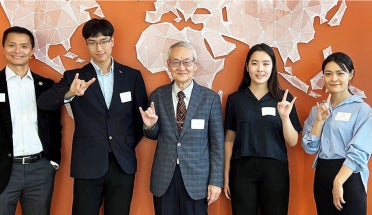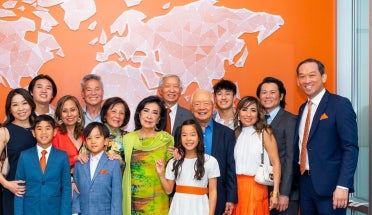
Texas Global Faculty Research Seed Grant Expands International Collaborations
- May 27, 2021
- Global Engagement and Strategy
Eleven UT faculty collaborating with peers in Ecuador, England, Germany, Mexico, Portugal, Scotland and South Korea have been awarded a Texas Global Faculty Research Seed Grant, an initiative designed to cultivate international partnerships and fund transnational research that addresses some of the world’s most pressing challenges.
The eight funded projects tackle one or more of the United Nations’ Sustainable Development Goals (SDGs). The SDGs are a central component of the UN’s 2030 Agenda for Sustainable Development, which was adopted by UN member nations in 2015.
“We are pleased to support UT faculty and their research endeavors with peer collaborators across the world,” said Sonia Feigenbaum, senior vice provost for global engagement and chief international officer. “The awards for this round of competition represent interests in a broad range of fields including global health, ecology and sustainable development and address several UN SDGs thereby demonstrating our commitment to transnational collaborations that will yield tangible results.”
The Texas Global Faculty Research Seed Grant provides financial support to faculty across all disciplines to develop and strengthen new or existing partnerships with leading higher education institutions and organizations around the world. Faculty awardees receive up to $10,000 to aid research collaborations, including sponsoring guest speakers or public lectures, organizing symposia and facilitating other research activities, both in-person and virtual. Since the inception of the program in November 2020, Texas Global has awarded 17 grants to 22 UT Austin faculty members.
May 2021 Faculty Grant Recipients and Projects
Anthony Di Fiore, Ph.D.
Professor, Department of Anthropology, College of Liberal Arts
Timothy Keitt, Ph.D.
Professor, Department of Integrative Biology, College of Natural Sciences
D. Max Snodderly, Ph.D.
Professor, Department of Neuroscience, College of Natural Sciences
Project Title:
Next-Generation Tropical Ecology: Leveraging Emerging Technologies to Study Biodiversity in a Hyperdiverse Forest Ecosystem
International Partners:
Gonzalo Rivas-Torres, Ph.D. – Universidad San Francisco de Quito
Juan Manuel Guyasamin, Ph.D. – Universidad San Francisco de Quito
David Rome, Ph.D. – Universidad San Francisco de Quito
Project Summary:
The field of wildlife and conservation ecology is being revolutionized by the adoption of novel methodologies that allow researchers to collect valuable ecological and behavioral information indirectly, noninvasively, and with less investment of time and personnel than ever before. Widespread use of camera and video trapping, passive acoustic recording, remote sensing, and noninvasive genetic sampling, for example, have all provided wildlife ecologists with new insights into the distributions of cryptic and rare species, community compositions, and ecological dynamics at various sites around the world. With this proposed project, which leverages existing international collaborations between biologists from The University of Texas at Austin and the Universidad San Francisco de Quito (USFQ) in Ecuador, we aim to field-test several additional cutting-edge approaches to biodiversity characterization and ecological monitoring at a remote site located in one of the world's most diverse tropical ecosystems, the western Amazon Basin. Specifically, we propose to evaluate the efficacy of using environmental DNA (eDNA) "metabarcoding" as a low-cost, noninvasive way for simultaneously identifying the many different taxa present in the vertebrate community at the site and to explore the use of unmanned aerial vehicles (UAVs, or "drones") for conducting animal population surveys and for collecting air samples ("eDNAir", or airDNA) for metabarcoding analysis as a way to examine plant flowering patterns.
David Espinoza, Ph.D.
Associate Professor, Hildebrand Department of Petroleum and Geosystems Engineering, Cockrell School of Engineering
Project Title:
CO2 Migration through Complex Plumbing Systems in Sedimentary Basins
International Partner:
Joe Cartwright, D.Phil. – University of Oxford
Project Summary:
The combination of carbon capture and geological storage is one of the most promising technologies to support the UN Sustainable Development Goals of “Affordable and Clean Energy” and “Climate Action.” The energy industry has the means to capture and inject CO2 in geological formations. However, commercial scale deployment of CO2 geological storage necessitates robust methods to assess the sealing capacity of sedimentary basins to avert undesirable leaks and trap CO2 permanently. Natural geological systems are remarkably heterogeneous. Moreover, our capacity of imaging the subsurface at high resolution and finding potential leaking points is quite limited. This project will combine the expertise of Prof. Cartwright in mapping complex offshore sedimentary basins and the expertise of Prof. Espinoza in simulating CO2 flow in order to make predictive models of CO2 migration through complex plumbing systems in sedimentary basins. The investigators will apply multiphase fluid flow theory to offshore settings characterized by the presence of fluid escape pipes and multiple growth faults. The results will permit identifying CO2 migration paths and quantifying migration rates. The proposed work has the potential to establish guidelines to the selection of target storage locations in the two most attractive targets for large scale CO2 storage: The North Sea and The Gulf of Mexico.
Stephanie Grasso, Ph.D.
Assistant Professor, Department of Speech, Language & Hearing Sciences, Moody College of Communication
Project Title:
Patterns of Language Recovery in Mexican-origin Spanish Speakers with Aphasia
International Partner:
Ana Luisa Sosa-Ortiz, Ph.D. – Instituto Nacional de Neurología y Neurocirugía
Project Summary:
Primary progressive aphasia is a neurodegenerative disorder that presents with gradual worsening of communication abilities. The onset of this disorder is much earlier than typical Alzheimer’s dementia and leads to a diminished ability to engage in activities of daily living (including workforce participation). There is currently no cure for this disorder; however, a growing body of evidence; however, a growing body of evidence from the field of speech-language pathology has shown that behavioral interventions targeting specific communication skills can lead to improved communication abilities despite ongoing neurodegeneration. The vast majority of studies have engaged highly educated English-speaking participants and little is known about patterns of treatment response in Spanish speakers, especially those from low-resource backgrounds. In this project, we will conduct a feasibility study, which will comprise of a tailored behavioral intervention program aimed at improving communicative function in individuals living with this devastating condition via an international partnership with the National Institute of Neurology and Neuropsychiatry in Mexico City. This work will provide fundamental information regarding evidence-based treatment for Spanish-speaking Latinxs who do not routinely have access to such services. The findings from this study will have implications for optimizing service delivery in Mexican-origin Latinxs living in both Mexico and United States.
Junfeng Jiao, Ph.D.
Associate Professor, Community & Regional Planning, School of Architecture
Project Title:
Developing Smart Energy Neighborhoods in Seoul for Energy Efficiency and Resiliency
International Partner:
Steven Jige Quan, Ph.D. – Seoul National University
Project Summary:
The rising unprecedented threat of climate change and constant population increase have increased cities’ energy consumption worldwide. To maintain cities’ sustainability and resiliency, improving urban energy efficiency is a mandatory task. Past studies have typically focused on narrow approaches to sustainable solutions and many have failed at simultaneously incorporating different disciplines. This study incorporates architectural design, urban planning, and energy technology studies with a developing partnership with Seoul National University. Through the gathering of neighborhood administrative boundaries selection sampling in Seoul using Gaussian Mixture Model, the total number of 50 samples in approximate will be chosen. Additionally, we will develop a new Smart Energy Neighborhood model, and run validation to test energy performance potential. In regard of testing performance potential, the study will use multi scenarios using various energy technologies. Finally, we will invite guest lecturers from Seoul National University to present to the UT Austin community to further explore a research topic and expand our collaboration.
Fernando Llanos Lucas, Ph.D.
Assistant Professor, Department of Linguistics, College of Liberal Arts
Danny Law, Ph.D.
Associate Professor, Department of Linguistics, College of Liberal Arts
Project Title:
Documenting Neuroplasticity in Native Speakers of Endangered Languages in Latin America
International Partner:
Emiliana Cruz, Ph.D. – Centro de Investigaciones y Estudios Superiores en Antropología Social (CIESAS)
Project Summary:
The global diversity of human languages showcases the effusive cultural adaptation that is a hallmark of our species, but much of this diversity is endangered. Approximately 82% of the world's 6,700 languages are spoken by populations under 100,000. The increasingly rapid loss of language diversity drastically limits opportunities to expand our scientific understanding of human language and its full range of possibilities. Because of this impending mass language extinction, linguists are trying to learn as much as they can about endangered languages before they are gone. Many of these efforts entail the documentation and description of grammatical features that are rare or even unique to a particular language. Such typologically marked language features are particularly informative for linguistic science, as they can show limits and possibilities of human language that would otherwise remain unknown. Linguists continue to steadily produce basic descriptions of these rare features, but very little is known about how such features are represented in speakers' brains. Studies of neurological activity related to language are overwhelmingly focused on major world languages, representing an extremely narrow sample of human linguistic diversity. In this multi-site international research project, we will use cutting-edge portable electroencephalogram (EEG) technology to document language-dependent adaptations of cognitive function (neural plasticity) with respect to complex and typologically unusual sound systems in native speakers of two endangered languages in Latin America: Eastern Chatino (Mexico) and Chajul Ixil (Guatemala). Our project will contribute to understanding the effects of neuroplasticity in the context of these linguistically remarkable, socially marginalized, and underrepresented languages. This provides an important complement to the narrow range of majority languages upon which current theories of human cognition and neurolinguistics rest. Because the neglect of these particular languages in the scientific literature is, in part, due to the ongoing disenfranchisement of their speakers, this project also represents a necessary step towards combating the social stigmatization and marginalization of indigenous Latin American languages like Eastern Chatino and Chajul Ixil.
Filippo Mangolini, Ph.D.
Assistant Professor, Department of Mechanical Engineering, Cockrell School of Engineering
Project Title:
Engineering Lubricious Interfaces for Enhancing Sustainable Development
International Partner:
Fábio Emanuel de Sousa Ferreira, Ph.D. – University of Coimbra
Project Summary:
The prosperity and economic growth of developed countries relies on the continuous and reliable access to affordable and clean energy. Diversification of energy sources has been pivotal to ensure energy security, while enhancing industrial output and competitiveness. Continued prosperity requires securing the sustainability of our energy use. A cornerstone in achieving this is the improvement of energy efficiency through the development of engineering solutions that can reduce energy losses in moving mechanical components and damage of sliding surfaces. Improved approaches to reduce friction and wear could not only result in enormous energy savings and benefits for safety and industrial productivity, but also lead to drastic reductions in greenhouse gas emissions and accumulations. The development of low-friction and wear-resistant sliding systems is a challenging engineering problem due to the complex phenomena occurring at sliding interfaces. The exploration of novel interdisciplinary collaborations can provide the required combination of complementary expertise needed to solve this global challenge.
The overarching goal of this collaborative research project is to develop a fundamental understanding of the interactions between a class of advanced coatings with high wear resistance, namely europium- and gadolinium-alloyed diamond-like-carbon (Eu-DLC and Gd-DLC), and a class of green, energy efficient lubricant additives, namely phosphorus-based ionic liquids (ILs). To achieve the goal of the project, a multi-technique, and multi-scale approach will be used. The experimental approach will rely on a highly integrated study that couples the growth of Eu-DLC and Gd-DLC, the synthesis of ILs, the evaluation of the lubrication performance of the tribological system, and the elucidation of the underpinning lubrication mechanism through the identification of the phenomena occurring at sliding interfaces. These aspects are all intrinsically intertwined, yet coordinated studies that bring together the required capabilities have been limited. The project will allow a diverse group of international researchers to combine their efforts and exploit their complementary expertise with the aim of developing the knowledge needed to inform the required combination of structure/chemistry of DLCs and composition of ILs to produce the desired tribological behavior. The outcomes of the project will thus lead to a paradigm shift through the development of the knowledge necessary for rationally designing the combination of alloyed-DLC materials and ILs able to reduce energy losses and materials degradation in moving mechanical systems.
Mohammed Maniruzzaman, Ph.D.
Assistant Professor, College of Pharmacy
Project Title:
3D Printed Medicines for Patient-Specific Treatment of COVID-19
International Partner:
Jerry Heng, Ph.D. – Imperial College London
Project Summary:
The recent outbreak of the severe acute respiratory syndrome-related coronavirus, SARS-CoV-2, and its associated disease, COVID-19 has been declared a public health emergency of international concern. But unfortunately, there’s no approved anti-viral available with tailored therapeutic effects which could potentially combat this killer disease. Oral drug delivery has appeared as most acceptable administration route, because it is cost-friendly and accessible. However, the current paradigm of oral dosage manufacturing has limited flexibility and is undertaken in more like one-size-fits-all fashion. The inter-individual variability of patients, including different races, genders, ages, pharmacogenetic profiles, and pharmacokinetic characteristics, is frequently an issue for appropriate therapeutic outcomes. To address these technical challenges, we propose an innovative, low-cost, and a first-of-its-kind powder jetting 3D printing system coupled with continuous manufacturing platform such as twin-screw granulation to develop 3D printable hybrid dosage forms containing multiple anti-viral drugs to combat global health crisis.
Marina Peterson, Ph.D.
Associate Professor, Department of Anthropology, College of Liberal Arts
Project Title:
Elements for a Sustainable Future
International Partners:
Gretchen Bakke, Ph.D. – Humboldt University
Rhys Williams, Ph.D. – University of Glasgow
Project Summary:
“Elements for a Sustainable Future” is an ethnography of elements used for renewable energy, focusing on the visions of the future they enable. Research at sites in Texas, Scotland, and Germany will investigate the ways in which elements are extracted and by whom, considering the infrastructures required for their trade, containment, and use. Moreover, it will examine how the elements support sustainability as a distinctive guide for human activity with an eye toward the future. In this way, the project supports the UN Sustainable Development Goals of “Affordable and Clean Energy,” “Industry, Innovation, and Infrastructure,” “Sustainable Cities and Communities,” and “Responsible Consumption and Production,” while engaging the terms by which these goals are achieved and their consequences. Texas, Scotland, Germany are key locations in the global production and use of elements for renewable energy; the opportunity to conduct ethnographic research with collaborators based in the respective sites will provide an on the ground understanding of lived and imagined energy futures. The primary outcome is an edited volume with an entry on each of the elements in the periodic table, co-edited by the research team with entries from the team along with leading scholars working in the field of energy humanities.



